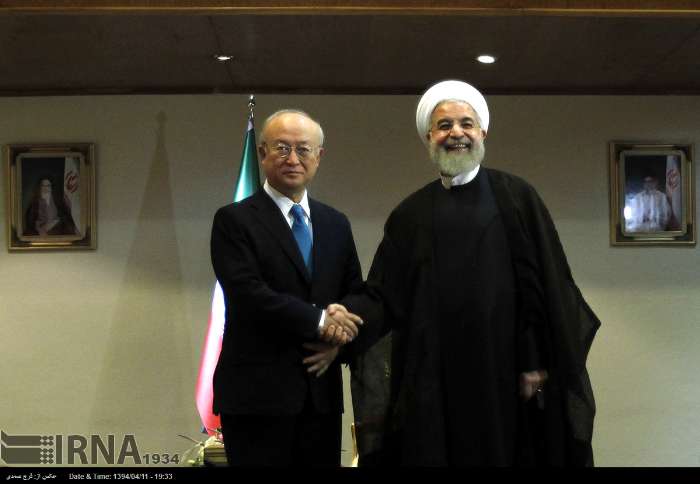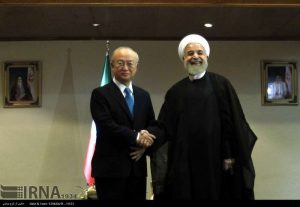
Amano’s Report and the Promise of Greater Transparency in the Nuclear Programme
All eyes are on the International Atomic Energy Agency’s (IAEA) Board of Governors, as it is expected to vote on the closure of Iran’s PMD file on 15 December. Yukio Amano, the Director General of the IAEA, will present his final report to the Board for its final decision on Iran’s PMD file.
Meanwhile, a delegation lead by Abbas Araghchi, Iran’s Deputy Foreign Minister, has left Tehran for Vienna to attend the second meeting of the Joint Commission, which was established to monitor the implementation of the Joint Comprehensive Plan of Action (JCPOA). The purpose of the meeting is for Iran and the six negotiating countries (the ‘P5+1’) to exchange updates on the implementation of the nuclear deal. Meanwhile, the six countries are members of the IAEA’s Board of Governors and their vote on 15 December could play a significant role in the closure of Iran’s nuclear file.
Hamin Baidi-Nejad, one of Iran’s negotiators, said Iran would be consulting with the P5+1 during the drafting process of the resolution to be presented to the Board of Governors. This is an attempt for Iran to confirm the permanent closure of the PMD file through a guaranteed unanimous vote at the Board meeting.
During his last interview, Mr. Araghchi confirmed that in consultation with Iran, the draft resolution has been finalized, and based on the text, the PMD file will be officially closed. He said, “This draft will change the agenda of the Board of Governors’ meeting. The previous agenda was on the implementation of the safeguard agreement of the Non-Proliferation Treaty and the six provisions of Security Council resolution against Iran. However, the new agenda will be on the implementation of the nuclear deal, and, most importantly, it will cancel the Board of Governors’ last twelve resolutions condemning Iran.” Mr. Araghchi concluded that from Iran’s point of view, once the Board of Governors passes the resolution, the PMD file will be officially closed.
Based on news accounts of Amano’s report, it appears that there has been a generally positive assessment of Rouhani’s government across the world. Members of the nuclear negotiating team, as well as the Agency’s spokesperson, have had positive reactions to Amano’s report. On the other hand, Iran’s hardline conservatives were not shy about publicizing their harsh criticisms and condemning remarks. They criticized the government for deceiving the public, for ignoring the Supreme Leader’s nine conditions, and for disregarding the legal consequences of the report, which, according to them, might restrict Iran’s nuclear programme. Additionally, the hardline conservatives called Amano’s report the cruelest and poorest piece of writing ever published on Iran. Hassan Shariatmadari, foreign policy advisor to the Supreme Leader, told Kayhan Newspaper that the IAEA would never close Iran’s PMD file. This claim came during a time when all international news agencies were describing the cooperative mood of the international community towards Iran and their willingness to close Iran’s past records.
The increased attacks against the government come at a time when officials are gearing up for parliamentary elections. As part of their campaign strategy, it appears that the government’s opposition conservatives are trying to diminish the success of the nuclear deal – Rouhani’s most important fulfilled campaign promise- in exchange for more votes.
Amano’s Report and Rouhani’s Campaign Promises
One of Rouhani’s important campaign promises was to increase the trust of the international community in Iran’s nuclear activities. He promised to do so by increasing transparency in Iran’s nuclear file.
The realization of this promise demanded extensive negotiations with the P5+1 that took almost two years. Since the beginning of the negotiations in 2013, IAEA reports confirmed Iran’s cooperation with the Agency through its transparent nuclear activities. However, the Agency refused to call Iran’s nuclear activity ‘peaceful’ until its final assessments have been completed.
Now, Amano’s final report on Iran concludes that prior to 2003, Iran had mounted a “coordinated effort” to design tests of nuclear weapons components. The report further states that Iran’s activities never advanced beyond “feasibility and scientific studies,” and Iran never acquired the full technical capabilities to develop nuclear weapons. The report confirms that since 2003, Iran’s nuclear activities have been in full compliance with the IAEA’s regulations and policies.
Amano’s final report confirms Rouhani’s ambition to develop transparency in Iran’s nuclear programme. From around the world, positive reaction to Amano’s report implies a new and trustworthy chapter in Iran’s relations with the international community. So, only 30 months into his presidency, Rouhani has been able to fulfill his most important campaign promise and has improved Iran’s relations with the international community. Today Iran is close to witnessing its crippling economic sanctions being lifted by the West, and to experiencing a new and prosperous era promised by its president.

